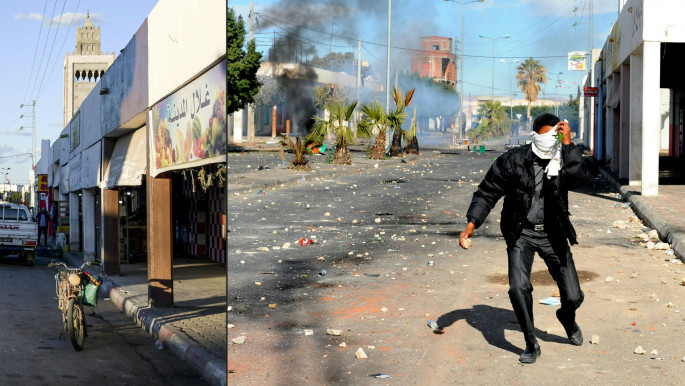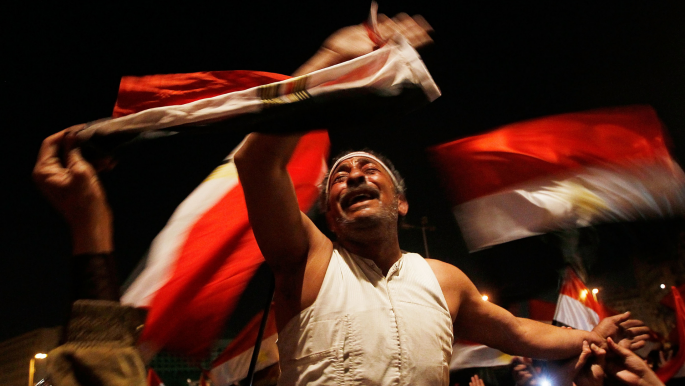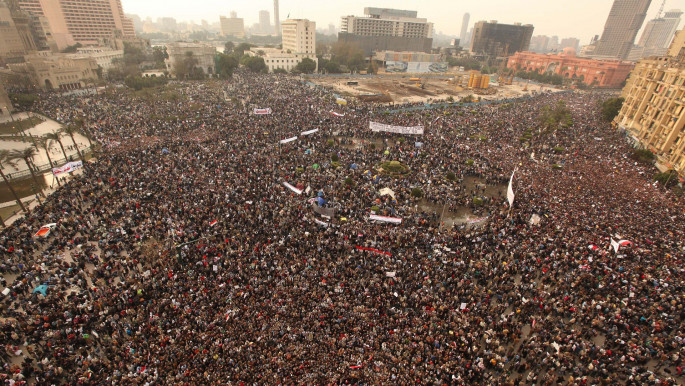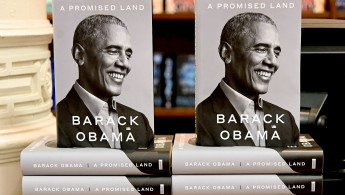Obama's memoir and the Arab Spring: America's missed opportunity to help democracy take hold
Entitled A Promised Land, the memoir traces the first two and a half years of his presidency and offers a retrospective of historical facts, analysis, confessions and motivations of the popular protests and their attempt at political and social transformation across the region.
Ultimately, the former president concedes that his administration fell short in its response. Supporting democracy in the Middle East was not a priority, and American interests would always outrank human rights.
Remorseful realism
Obama details how he and his staff anticipated possible popular outbursts from civilian populations against the dictators who had ruled over them for decades.
Upon returning from his historic visit to Cairo in 2009, Obama tells Denis McDonough, who later served as the White House Chief of Staff, that "sometime, somewhere, things are going to blow".
Yet he also admits a well-known but often undeclared fact – democracy in the Middle East has been the least of America's priorities over the past few decades, and by the time his administration realised it should support political freedoms it was already too late.
 |
Obama admits a well-known but often undeclared fact - democracy in the Middle East has been the least of America's priorities |  |
"For at least half a century, U.S. policy in the Middle East had focused narrowly on maintaining stability, preventing disruptions to our oil supplies, and keeping adversarial powers…from expanding their influence," he wrote, adding that "in pursuing each of these goals, [the subsequent US presidents] made autocrats [their] allies for being predictable… and committed to keeping a lid on things."
Obama further confesses that his administration would routinely turn a blind eye to human rights violations in the region if they did not serve American interests. "Every so often, a report would surface from the Pentagon or Langley, recommending that U.S. policy pay more attention to human rights and governance issues when dealing with our Middle East partners," he wrote.
"But then the Saudis would deliver a vital tip that kept an explosive device from being loaded onto U.S.-bound cargo planes or our naval base in Bahrain would prove critical in managing a flare-up with Iran in the Strait of Hormuz, and those reports would be relegated to the bottom of a drawer," he added.
 |
|
| Read more: After Arab Spring, a decade of upheaval and lost hopes |
"Only rarely did the United States scold allies like Egypt or Saudi Arabia publicly for their human rights violations. Given our concerns over Iraq, al-Qaeda, and Iran, not to mention Israel's security needs, the stakes felt too high to risk rupturing our relationships," he confessed.
Obama paints a picture of personal anguish of having to overlook human rights violations – indeed, he writes of being "haunted" by reports of detained rights activists in Cairo or Saudi Arabia – but nonetheless accepted that "this type of realism…was part of the job."
Already too late
Exactly four months prior to the Tunisian revolution in December 2010, Obama writes that his government's security agencies reported possible popular uprisings in the region.
In August, Obama used a Presidential Study Directive presented to him by a White House Staffer and a number of government agencies "to examine ways the United States could encourage meaningful political and economic reforms in the region to nudge those nations closer to the principles of open government, so that they might avoid the destabilizing uprisings, violence, chaos, and unpredictable outcomes that so often accompanied sudden change."
The National Security Agency conducted bi-weekly meetings with Middle East Experts and veteran diplomats, according to Obama, to reach a strategy for incorporating American foreign policy into the region.
"By mid-December, the documents laying out the strategy were just about ready for my approval, and although I realized that it wouldn't change the Middle East overnight, I was heartened by the fact that we were starting to steer America's foreign policy machinery in the right direction," Obama recalled. "If only our timing had been a bit better."
 |
Supporting democracy in the Middle East was not a priority and American interests would always outrank human rights |  |
A few days later, the Tunisian uprising began. Soon the regime was toppled, inspiring a series of similar protests across the MENA region, made up mostly of young people, "the first flickers of what became known as the Arab Spring."
But from the US perspective, Obama wrote, "the most significant developments were in Egypt, where a coalition of Egyptian youth organizations, activists, left-wing opposition parties, and prominent writers and artists had issued a nationwide call for mass protests against President [Hosni] Mubarak's regime."
Even though Obama was not a personal fan of Mubarak - as he had months earlier told academic and Pulitzer Prize-winner Samantha Power, who later became the US ambassador to the United Nations - his removal was precisely the scenario his Presidential Study Directive had sought to avoid.
"The U.S. government was suddenly caught between a repressive but reliable ally and a population insistent on change, voicing the democratic aspirations we claimed to stand for," Obama recalled.
Obama clarified in his memoir that the then-Egyptian president seemed "oblivious" about the events taking place around him. When Obama raised the possibility that the protests that had begun in Tunisia might spread to his own country, "Mubarak had dismissed it, explaining that 'Egypt is not Tunisia.'"
"Insulated as he was, he would see what he wanted to see, I thought, and hear what he wanted to hear - and none of it boded well," Obama said.
 |
|
| Read more: The soundtrack of the Arab uprisings in 10 songs |
Indecisive stance
Obama exposed the disagreements his team members had over the direction of travel in Egypt, refuting narratives still promoted to this day by Abdel Fattah al-Sisi's regime that then-Vice President Joe Biden and Secretary of State Hilary Clinton were pro-Muslim Brotherhood.
On the contrary, older and more senior administration members were cautious, emphasising the key role of Mubarak in the region and stating that "there was no way of knowing who or what will replace him."
Meanwhile, younger members, including Power and Biden's then-national security advisor, Tony Blinken, were convinced that the long-time autocrat had fully and irretrievably lost his legitimacy, considering it "both strategically prudent and morally right" for the US government to align itself with the forces of change.
Nevertheless, Obama himself remained indecisive about the rapidly escalating unrest in Egypt. "I shared both the hopes of my younger advisors and the fears of my older ones," he wrote.
Obama also detailed the anxieties of regional rulers, such as King Abdullah of Saudi Arabia, who feared that the spread of protests "was an existential threat to a family monarchy that had long squelched any form of internal dissent."
The Saudi king believed that groups such as the Muslim Brotherhood, Hezbollah, al-Qaeda, and Hamas were behind the protests in Egypt, assumptions that Obama himself says he was sceptical of.
 |
Obama paints a picture of personal anguish of having to overlook human rights violations but nonetheless accepted that 'realism was part of the job' |  |
In the meantime, Obama followed Clinton's advice and sent an envoy to Egypt that Mubarak trusted - Frank Winser, former US ambassador to Cairo in the late 1980s - for more extensive private consultations after the Egyptian dictator showed no positive reaction to his American counterpart's warnings.
Meanwhile, the indecisiveness of Washington's stance towards the situation in Cairo was questioned by the local press in DC, whereas foreign leaders in the region, including Israeli Prime Minister Benjamin Netanyahu, wondered why the US was not supporting Mubarak "more forcefully," warning him that another Iran could emerge in the region. They clearly expected the United States to choose, as Netanyahu put it, "stability" over "chaos."
In his best-seller, Obama also recalls how the Gulf monarchies were alarmed with his stance towards Mubarak, fearing that the Muslim Brotherhood would take over. Among them was Mohamed Bin Zayed, the crown prince of Abu Dhabi and de facto ruler of the United Arab Emirates (UAE).
According to Bin Zayed, Obama's statements showed that the United States was not a partner they could rely on. "MBZ told me that U.S. statements on Egypt were being watched closely in the Gulf, with increasing alarm," Obama, wrote, describing him as being the "savviest leader in the Gulf."
 |
|
| Ten years on, Tunisia is Arab Spring's only success |
"I had told him I hoped to work with him and others to avoid having to choose between the Muslim Brotherhood and potentially violent clashes between governments and their people," Obama wrote.
"The public message does not affect Mubarak, you see, but it affects the region," MBZ told Obama, suggesting that if Mubarak collapsed and the Muslim Brotherhood replaced him, there would be eight other Arab leaders who would fall.
Wisner's meeting with Mubarak, according to Obama, resulted in him declaring to the public that he would not run for another presidential term.
However, Obama's staffers remained divided over Mubarak's future. "The more senior members saw Mubarak's concession as enough justification to stick with him, while the younger staffers considered the move - much like Mubarak's sudden decision to appoint his chief of intelligence, Omar Suleiman, as vice president - as no more than a stalling tactic that would fail to placate the demonstrators," Obama recalled.
After Mubarak stepped down, it confirmed to popular movements in other Arab countries that change was possible. Among them were Syria and Bahrain, countries where "sectarian divisions ran high and privileged minorities governed large and resentful minorities," Obama wrote.
Obama recalls that following Mubarak's removal he was only cautiously hopeful, knowing that "for the celebration and optimism in the air, the transition in Egypt was only the beginning of a struggle for the soul of the Arab World – a struggle whose outcome remained far from certain".
Being a long-time adversary of the US and historically allied with Russia and Iran, the US options for Syria were limited, he confesses, despite "hours wrestling with how the United States could influence events". In the end, American interests were prioritised over the oppression of protesters by the Assad regime, with the administration ruling out any possible intervention.
 |
In the end, American interests were prioritised over the oppression of protesters by the Assad regime, with the administration ruling out any possible intervention |  |
"With Bahrain, we had the opposite problem: The country was a long-time U.S. ally and hosted the U.S. Navy's Fifth Fleet. That relationship allowed us to privately pressure King Hamad [Hamad bin Isa Al Khalifa] and his ministers to partially answer the protesters' demands to rein in the police violence," Obama wrote.
Obama concludes his recollections of the Arab Spring with the Libyan uprising and the US military intervention there. He relates the differences among his team members as to whether to intervene and save Libyan lives, and the moral dilemma he felt before he finally ordered military operations.
But the memoir involves discrepancies between the truth and reality. In his writings, Obama frames the intervention in Libya as a victory for his presidency, even though he had admitted years earlier that it was his "worst mistake", plunging the country into chaos.
Obama's memoir is detailed regarding some historical facts, while others are revealed for the first time. But there are glaring omissions regarding seminal moments in the initial aftermath of the Arab Spring, notably the exclusion of any reference to the killing of dozens of protesters in Egypt during the first days of protests, or the political mess caused by the rule of the Supreme Council of the Armed Forces (SCAF) following Mubarak's ouster.
In short, the memoir details significant facts about the era that may not have been publicly known before. Yet it ignores too many vital historical details for the book to be an accurate recollection of Obama's first presidential term, and how the Arab Spring impacted the status of the US in the region.
Horriya Marzouk is a pseudonym. The author resides in a jurisdiction where the publication of their identity may create a security or freedom of movement issue
Join the conversation: @The_NewArab



